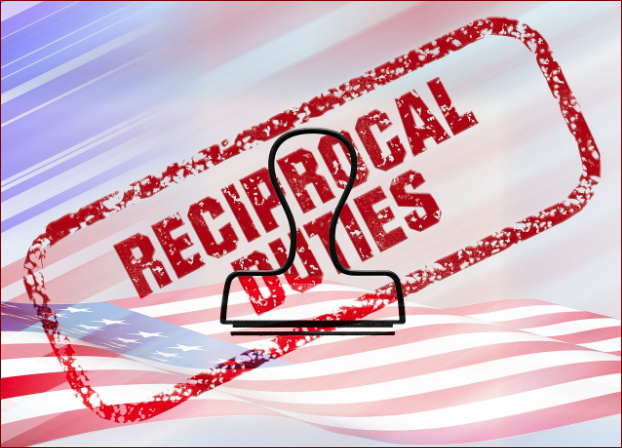The United States announced its most significant trade policy shift since NAFTA in 1994 when President Trump declared a national emergency on April 2, 2025, to address what he described as a “large and persistent U.S. trade deficit” through reciprocal tariffs. This sweeping policy imposes a 10% baseline tariff on all exports to the United States, with significantly higher duties on approximately 60 nations based on their trade imbalances with the U.S.
The implications for multinational companies — including importers, manufacturers, distributors, and retailers — will be immense, driving many to reassess their corporate structures. On this wave, agencies offering company registration in the UAE and other favorable jurisdictions emerge as a particularly attractive option for businesses seeking to restructure their operations away from direct U.S. trade exposure. But let’s start with the basics and analyze the most prominent shifts first.
How reciprocal tariffs are reshaping global trade
Southeast Asian nations are hit disproportionately under the new tariff regime, with Vietnam facing a staggering 20-40% additional tariff increase. These measures effectively upend China Plus One strategies that saw factories moving from the Northeast to Southeast Asia, forcing companies to reconsider their entire supply chain architecture.
Countries with neutral trade patterns or even trade deficits with the United States face a minimum 10% duty (the global tariff), while all other major trading partners (with the exception of Canada and Mexico) will be subject to sharply higher rates (the reciprocal tariffs).
The rise of offshore registration services
The dramatic shift in U.S. trade policy has created unprecedented opportunities for specialized registration firms to expand their services and capture new market segments.
Market leaders capitalizing on demand
The registration process in offshore jurisdictions is cheap and very straightforward, with many countries considered International (Free) Trade Zones for manufacturing and service companies, thus benefiting from zero taxation, streamlined registration procedures, and the ready availability of work and resident permits.
Several prominent registration firms have positioned themselves to capitalize on this trend:
- Incluence provides comprehensive offshore registration and a wide range of global business setup services
- BBCIncorp has expanded its services across 18 major offshore financial centers
- Acclime offers tailored offshore company registration in Europe, USA, Asia, the Middle East, and Africa
- Nomad Capitalist has helped over 1,500 high-net-worth clients with offshore structures
- Creation Business Consultants keeps expanding to new markets.
These firms report unprecedented demand as businesses seek alternatives to high-tariff jurisdictions.
UAE emerges as prime destination
The UAE has become a standout choice for offshore business registration. Offshore companies in the UAE are entities established under specific jurisdictions that offer favorable conditions for international business relocation, with operations serving primarily as vehicles for holding assets, international trade, and investment activities.
Key advantages include:
- 100% foreign ownership without local shareholding requirements
- Zero corporate and personal income taxes (though a 9% rate applies to some corporations above AED375,000)
- Confidential shareholder and director information
- Multi-currency banking capabilities
- No requirement for physical office presence.
The UAE offers three prominent jurisdictions: Ras Al Khaimah International Corporate Centre (RAK ICC), known for its cost-effectiveness and streamlined processes; Jebel Ali Free Zone (JAFZA) as a hub for trading offering extensive international market connectivity; and Ajman Free Zone, favored for affordability and flexibility, especially for startups.
Technology sector drives additional demand
The surge in offshore registrations coincides with explosive growth in cybersecurity and artificial intelligence sectors. Nearly half (47%) of small and medium-sized businesses updated their cybersecurity solutions to further protect their business, while more than a third (38%) are actively using AI across multiple business functions.
This technological transformation has created new opportunities for businesses operating through offshore structures, as companies seek to leverage global talent pools while maintaining competitive cost structures. Many technology companies are relying on offshore structures to manage intellectual property and facilitate international operations while maintaining access to specialized talent markets.

Alternative jurisdictions gaining traction
While the UAE has captured significant market share, businesses are increasingly exploring diverse options to optimize their international structures and reduce concentration risk.
Traditional offshore centers
The British Virgin Islands (BVI) has the largest number of registered offshore companies among all offshore jurisdictions, thanks to its strict compliance with international tax and corporate regulations. However, the destination list is getting more diversified. Popular alternatives include:
- Singapore: 17% corporate tax cap with transparent regulations
- Hong Kong: 16.5% corporate tax with 8.25% rate on the first HKD2 million
- Seychelles: Zero taxation with streamlined procedures
- Malta: EU jurisdiction benefits with 12.5% corporate tax
- Cyprus: Access to the EU single market with sound banking options.
Each jurisdiction offers distinct advantages depending on business activities and target markets.
Compliance and regulatory considerations
In adherence to international regulations against drug trafficking and money laundering, reputable registration firms strictly follow anti-money laundering procedures aligned with local laws. Modern offshore registration requires comprehensive due diligence and transparent beneficial ownership reporting.
Registration firms now provide comprehensive compliance packages including:
- Beneficial ownership registers
- Annual compliance monitoring
- Tax reporting assistance
- Banking relationship management.
Economic impact and market response
The tariff measures announced by President Trump on April 2, 2025, stimulated a major shift in the global trading business, with the US moving away from rules-based trade governance toward a results-oriented and probably more transactional approach.
JPMorgan analysts noted that if IEEPA tariffs were to cease, the effective tariff rate would fall from 13-14% to roughly 5%, double the level in 2024, demonstrating the significant impact these measures have on business planning and corporate structure decisions.
According to CEFR, no more than $478 billion will be collected from the new tariff revenues, with ten trading partners potentially paying $10 billion or more, representing less than four weeks of Federal government outlays. This massive revenue transfer has prompted businesses to seek structural alternatives to maintain competitiveness.
Future outlook for registration services
The registration services industry expects continued growth as businesses adapt to the new trade environment. Understanding the implications of these measures requires a clear view of the tariff landscape, as accurately measuring applied tariffs remains a challenge even for policy experts.
Several trends are shaping the industry:
- Increased demand for multi-jurisdictional structures
- Growing emphasis on digital incorporation processes
- Enhanced compliance and transparency requirements
- Integration of AI and automation in registration procedures
- Focus on cybersecurity for offshore banking and operations.
Registration firms are investing in technology platforms to streamline the incorporation process while maintaining strict compliance standards. The industry transformation reflects broader changes in how global businesses structure their operations in response to protectionist trade policies.
As international trade becomes increasingly fragmented, offshore registration services provide essential infrastructure for businesses seeking to maintain global competitiveness. The success of these firms in 2025 demonstrates the enduring value of flexible corporate structures in an uncertain geopolitical climate.
DISCLAIMER – “Views Expressed Disclaimer: The information provided in this content is for general informational purposes only and does not constitute financial, investment, legal, tax or health advice. You should not rely on the information as a substitute for professional advice tailored to your specific situation. Any opinions expressed are those of the author and do not necessarily reflect official position of any other author, agency, organization, employer or company, including NEO CYMED PUBLISHING LIMITED, which is the publishing company performing under the name Cyprus-Mail…more






Click here to change your cookie preferences